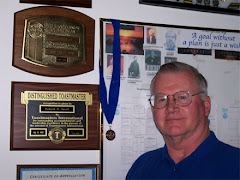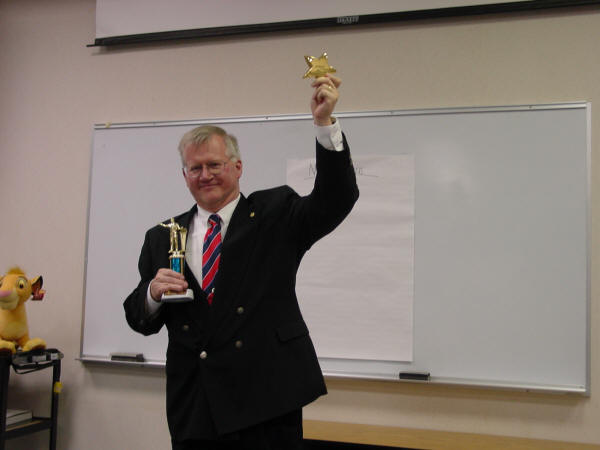I have heard this argument from many people so I thought I would throw in my dollars worth.
Websters 2001 give us these definitions.
Evaluate: To judge, or determine the significance, worth, quality of:
To assess, estimate or appraise.
Judge: To form an opinion or estimate, determine, value,
regard or
consider.
Sound similar don't they!
Most people think that when they judge they are being very logical which
says that they are using the
left brain functions. Left brain functions relate to numbers, words, lists, sequences,
analysis, and logic.
Example how an engineer might view, value, analyze or make a decision on something.
Right brain functions consist of rhythm (which is why some very specific
techniques work in speaking), Wholeness (patterns, and completions), Colour, Dimension, daydreaming and imagination.
Example how a painter might view, value or analyze make a decision on something.
A lot people think that these functions are totally exclusive of each other.
Nothing could be further from the truth.
What does the right brain, left brain have to do with evaluation versus judging "EVERYTHING". We are human and being human when we evaluate or judge our likes, dislikes, life experiences, memories, all that makes us human influences our decisions and values.
Our values determine the things we see, what we hear, how we
perceive what we see and hear and the decisions we make based on those values.
Our reticular activation system will focus in on what is important to us at the time we are listening to a speech. All these factors influence how we judge and or evaluate and cannot be
separated.
The skill of evaluating a speech is a learned pattern of how to analyze speeches (sound familiar). We learn these patterns by watching how other people judge/evaluate.
Although there is no totally right or wrong way to judge/evaluate. There are more effective ways.
In a toastmasters club we learn to focus in on the good things the speaker says or does. In most evaluations you hear :you did this good, you did that good,
ect,
ect". "You were so good, I really cannot give you any suggestions for improvement". I can't wait to hear your next speech.
Of course the evaluator may be thinking "I and wait for you to bore me again". Phooey!
How can a speaker grow if we don't give qualified and effective feedback. Did you join Toastmasters so that you could give great speeches at your Toastmasters Club. I DON'T THINK SO.
Or the evaluator will
regurgitate the speech back to the speaker. Who ever came up with this useless technique.
1. At the end of the speech can you even remember the speakers opening
statement (it should
engage the audience). If you can't remember it
it was not effective. I will write further about openings at a later date.
2. Can you remember the closing. Did the speaker tie all their points together.
3. What was your (the evaluator/judge) take away value from the speech?
Can you clearly explain the value "YOU" took away from the speech to
someone else?
4. Did the speaker have any annoying
mannerisms.
5. Were the conversations between the speakers characters distinctive?
Or did the speaker use the "he said, she said" approach.
If so the speaker was giving a monologue and not drawing YOU into
the story by making it present day situation. Total accuracy in not important. The purpose of the story is to reinforce the point the speaker is making.
6. Eye Contact. Now here is something that most evaluators/judges
do not clearly understand. Swiveling the head from side
to side is not eye contact. All it is, is scanning the audience
there is no way to make a connections by scanning the
audience (more on this later).
7. Did the speaker set the stage so that "you" relived the story by using common words or situations to draw you in emotionally? Emotion is how we make the majority of our decisions. We try to be logical in our analysis but its how we feel in our gut that influences the final outcome.
8. Did the speaker give you a reason to even care about the speech
they gave?
As I said in the
beginning there are different opinions. And there are many factors that influence the answer. It is my goal to give you something to ponder when you are asked to evaluate/judge in the future.
Many Judges/Evauators base their decisions about how a good or effective a speech is based solely upon the entertainment factor. I have seen people win speech contests solely on the entertainment factor alone with no reguard to technical merit, skill, or standard judging criteria. When these speakers go on to the next level and do not do well we cannot figure out why?????
Speaking is a changing field, so must our judging/evaluation skills must change if we are to prepare the speakers in our clubs to be able to be effective speakers when speaking outside our Toastmaster Clubs.
Speakers can only grow if we give them some real time (based on current speaking techniques) suggestions for improvement. Many experienced toastmasters are stuck in a time warp. When we are judging speeches we are evaluating them at the same time. Our decisions are based on our personal biases, experiences and current skill levels.
The World Championship of Public Speaking (both semi finals and final will take place in mid August. I will be there and will post my observations on some of the speeches. It should be fun.





